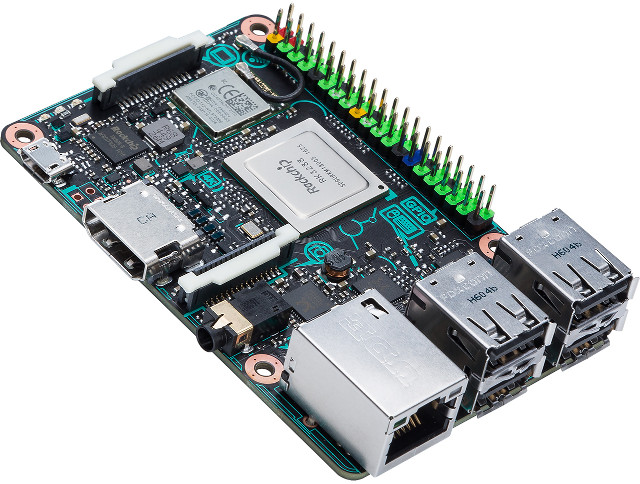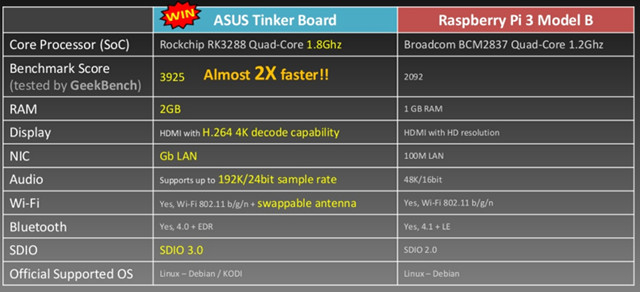Regular readers may remember MQMaker MiQi board, a $35 (and up) development board powered by Rockchip RK3288 quad core ARM Cortex A17 processor, based on Raspberry Pi 3 form factor, but much faster according to benchmarks. Sadly, the board’s crowdfunding campaign was not that successful, possibly because of the “its’ a 2-year old processor” syndrome. But now, Minimachines has found that ASUS has designed a very similar board, dubbed Tinker Board, with an extra WiFi and Bluetooth LE module, audio jack, MIPI DSI connector, and a few other modifications.

Asus Tinker Board specifications (bold highlights and strike-through show differences with MiQi board):
- SoC – Rockchip 3288 quad core ARM Cortex A17 up to 1.8 GHz with Mali-T764 GPU supporting OpenGL ES 1.1/2.0 /3.0, and OpenCL 1.1
- System Memory – 2GB LPDDR3, dual channel
- Storage –
8 or 32 GB eMMC flash+ micro SD slot - Video output & Display I/F
- 1x HDMI 2.0 up to 3840×2160@60p
- 1x 15-pin MIPI DSI supporting HD resolution
- Audio – 1x 3.5mm audio jack; Realtek HD codec with 192KHz/24-bit audio
- Connectivity – Gigabit Ethernet, 802.11 b/g/n WiFi, Bluetooth 4.0 + EDR
- USB – 4x USB 2.0 host ports, 1x micro USB port (for power)
- Expansion Headers
- 40-pin “somewhat Raspberry Pi compatible” header with up to 28x GPIOs, 2x SPI, 2x I2C, 4x UART, 2x PWM, 1x PCM/I2S, 5V, 3.3V, and GND
- 2-pin contact point with 1x PWM signal, 1x S/PDIF signal
- Misc – Button, unpopulated fan header
- Power Supply – 5V/2A via micro USB port
- Dimensions – 85.6 x 54 cm
The company targets education, maker, and IoT markets for the board, with applications ranging from mini PC to portable game console and RC products like drones. The board supports Debian with Kodi.
 ASUS also provided a quick comparison table with Raspberry Pi 3 model B, that mostly shows the advantages over the Tinker board. The table is mostly fine, and I got some Phoronix benchmarks showing RK3288 can be about three times as fast as BCM2837 processor for FLAC audio encoding. The last row with officially supported OS appears to show both boards on the same footings, but Raspberry Pi 3 model B will have a clear advantage here, although I’m not sure why Asus did not list Android OS support for their board. The table does not include any price information either.
ASUS also provided a quick comparison table with Raspberry Pi 3 model B, that mostly shows the advantages over the Tinker board. The table is mostly fine, and I got some Phoronix benchmarks showing RK3288 can be about three times as fast as BCM2837 processor for FLAC audio encoding. The last row with officially supported OS appears to show both boards on the same footings, but Raspberry Pi 3 model B will have a clear advantage here, although I’m not sure why Asus did not list Android OS support for their board. The table does not include any price information either.
The only information I could find was from the Slideshare presentation above, and there does not appear to be any official website or page on Asus website.
[Update: ASUS Tinker board can now be purchased on Amazon or Aliexpress]
Thanks to Freire for the tip.

Jean-Luc started CNX Software in 2010 as a part-time endeavor, before quitting his job as a software engineering manager, and starting to write daily news, and reviews full time later in 2011.
Support CNX Software! Donate via cryptocurrencies, become a Patron on Patreon, or purchase goods on Amazon or Aliexpress




